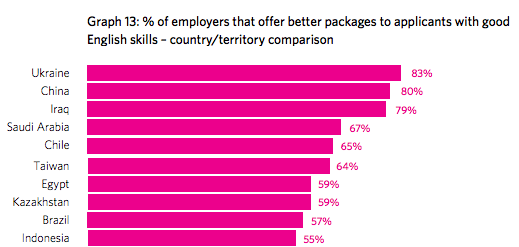English skills increase workplace perks
Published 20/04/2017
Ukraine, China and Iraq are the three countries where employers are most likely to offer a better starting package to employees with good English skills, according to a new survey that highlights an English language skills gap at businesses worldwide.
The vast majority of employers in Ukraine (83%) said they would offer additional benefits to English-speaking employees, along with 80% in China and 79% in Iraq.
Around two-thirds of employers in Saudi Arabia and Chile also said they would make a more attractive job offer in exchange for English skills.
In fact, more than half (57%) of the businesses in non-English speaking countries that took part in this year’s QS Global Employer survey said they provide a better starting package to potential employees with good English skills – including a higher salary, faster progression or more senior roles.

The top 10 non-English speaking countries where employers said they were most likely to make a better offer to a candidate with good English skills
They survey by QS and Cambridge English of more than 5,300 businesses worldwide, showed that nearly seven in 10 (69%) of employers based in countries and territories where English is not an official language said that English is nevertheless significant for their organisation.
More than 40% of these employers reported a skills gap when it comes to recruiting employees with good English skills. This reduces to 25% across middle and upper management.
The findings were consistent across all industries, noted Blandine Bastié, country head, UK and Ireland at Cambridge English Language Assessment: “In every industry, there is at least a 40% skills gap between the English language skills required and the skills that are available, irrespective of business size.”
Large enterprises employing more than 2,500 people were more likely to value English than micro-businesses of fewer than 10, but the gap was not significant – across all business sizes, between 67% and 78% of employers valued English.
The extent to which English is considered important varies greatly by country. In Germany and Portugal, for example, employers were unanimous; whereas in Chile, just under half (48%) said English was an important skill for the business.
Aerospace and defence was the area of business where English was most valued, with 89% of employers in non-English speaking countries rating it as important, followed by law, energy and telecoms.
Meanwhile, just half of those in the construction industry said the language is important.
The post English skills increase workplace perks appeared first on The PIE News.

